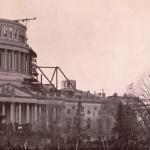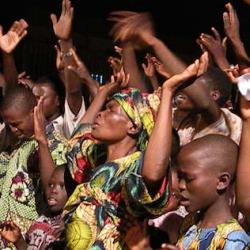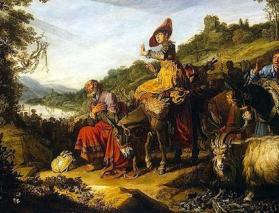In his Death, Burial, and Rebirth in the Religions of Antiquity, Jon Davies attends to the communal significance of the deaths of biblical patriarchs.
He writes, “Jacob is gathered ‘unto his people,’ not explicitly unto his God. On the orders of his son Joseph, Jacob was embalmed (a rare occurrence of this practice in Judaism) and carried, in a great procession, out of Egypt to Canaan and buried, in accordance with Jacob’s instructions, at Machpelah. Joseph too was embalmed and ‘put in a coffin in Egypt’, to be taken by Moses (Genesis 50:26) and buried in Shechem in a parcel of ground which became ‘the inheritance of the children of Joseph’ (Joshua 24:32). Joshua was buried ‘in the border of his inheritance’ (Joshua 24:30) near Mount Ephraim, in an oddly imprecise location.”
All this indicates that “Burial is the title to the land, and the tomb the proclamation of its extent. Indeed, the Hebrew word for the place of burial is also the word for dwelling.”
If burial highlighted the promise of land, it equally emphasized the promise of fruitfulness: “The burials of the Patriarchs are, however, couple-burials. All three Patriarchs are accompanied by their wives, although Jacob’s favourite wife Rachel is, in some accounts, buried at Ramah among the ‘Graves of the Children of Israel’ where, unusually for either men or women, her grave was marked by a stone pillar erected by Jacob. . . . Absalom (2 Samuel 18:18) erected a pillar—in Hebrew a ‘hand-phallus’ —for himself because he had no son to keep his name in remembrance. Over and above the honouring of the wife and mother is, in the tomb-proclamation of marriage, the expression of heirs and fruitfulness, of progeny and therefore of ownership and possession—of the importance, therefore, of proper relations between the generations, which required an identifiable burial place.”
Moses’ death, of course, diverges from this model: “The death of Moses is unique, certainly in the fact that he was buried by God. Neither was he ‘gathered to his fathers’ (as he clearly could have been) but has no known grave.”
But that doesn’t change the fundamental meaning of death and burial. Moses’ death, like those of the patriarchs, points to the inheritance. Moses’ death “gives the territory-claiming competence of his burial a very great scope indeed: the Promised Land, all of it. In that sense his death and burial share with those of the Patriarchs the character of individual deaths with a collective purpose, the creation of a record of occupancy and ownership, of a moral as well as a geographical journey, of a people as well as of their leaders.”











